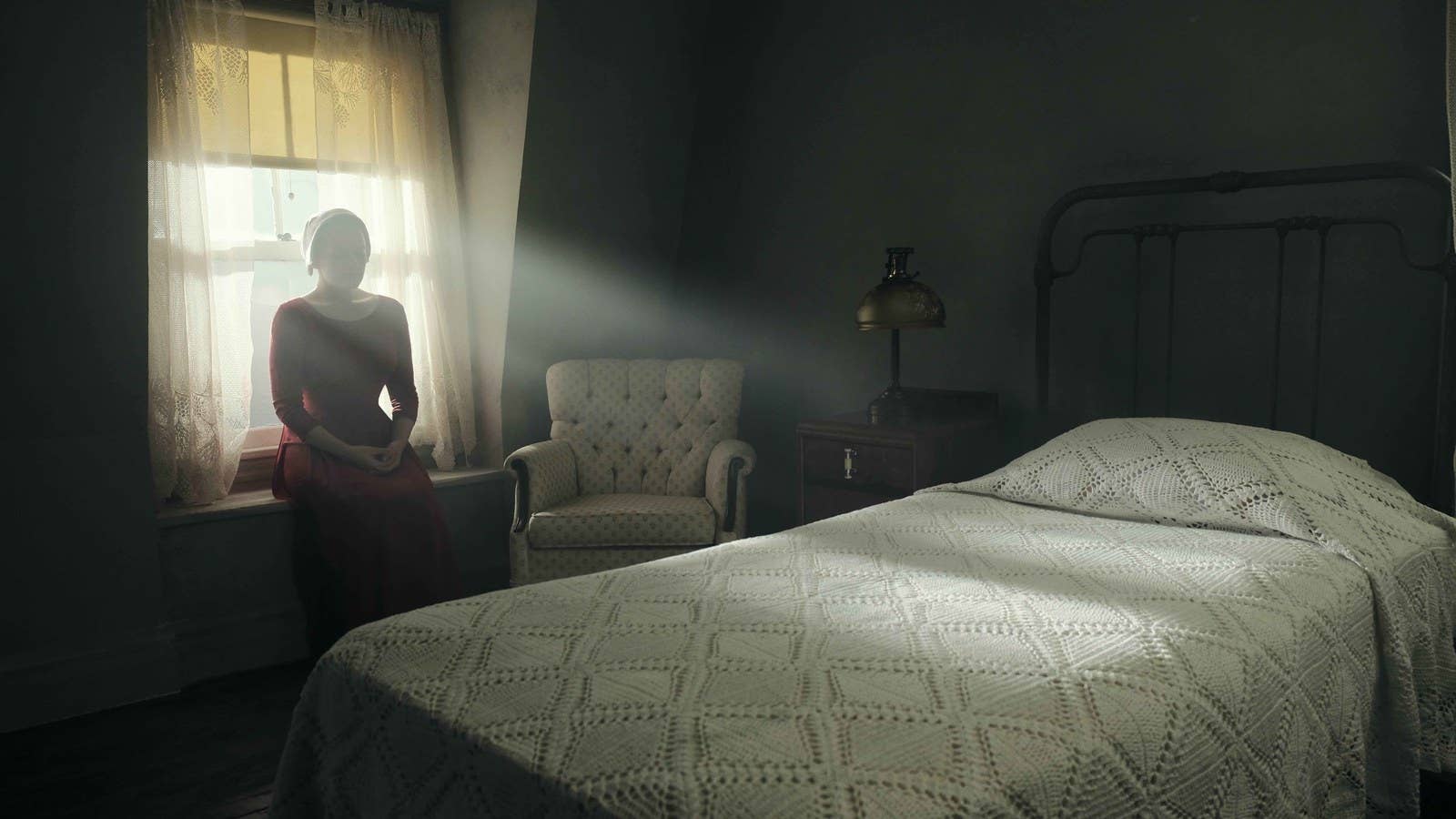
When Margaret Atwood's novel The Handmaid's Tale was released in 1985, it was a work of speculative fiction: In the near future, a puritanical, militarized sect has taken over most of the United States, now known as Gilead. All of Congress has been killed; the Constitution has been suspended. Because of deteriorating fertility and plummeting birth rates — a pandemic of miscarriages and birth deformities have been caused by environmental toxicity, and healthy babies are rare — a new system has been put in place to ensure population growth: Handmaids are women with healthy ovaries who serve powerful, childless couples. They submit to a monthly ritual called the Ceremony, in which a Commander, a member of Gilead's ruling class, tries to impregnate a Handmaid as she lies in his wife's lap. Handmaids are actually in a relative position of privilege compared to other women, who work as house staff, are wives to lowly workers, or are sent to the faraway Colonies to clean up nuclear waste (and die from it).
Hulu was well on its way to making a television adaptation of The Handmaid's Tale when Donald Trump was elected president in November. It was officially announced in April 2016, with Mad Men's Elisabeth Moss as its star, a Handmaid named Offred, and Bruce Miller (ER, The 100) as its TV creator. Yet in the wake of Trump's surprise victory, and as his tumultuous first 100 days as president comes to a close, watching The Handmaid's Tale might feel uncomfortably real.
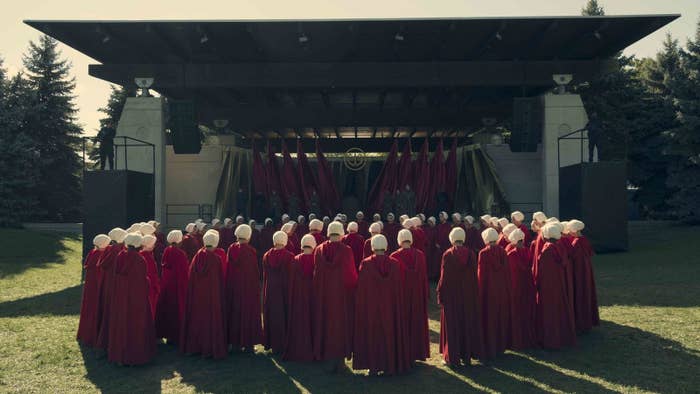
Regardless of one's political stripe, there's an instability and a chaos these days, and a feeling that anything can happen. Such is the mood of The Handmaid's Tale. There aren't one-to-one comparisons between Trump policies and the show's vision of Gilead, but the book and its imagery have become powerful symbols unto themselves. On Jan. 21, as people marched around the world for women's rights, some held signs that read, "Make Margaret Atwood fiction again," "The Handmaid's Tale is not an instructional manual," and "No to the republic of Gilead." A couple of months later, a group of women dressed as Handmaids — in rich red cloaks and starchy white bonnets — showed up in Texas's state Senate to protest measures that would curb abortion rights.
More than anything, though, The Handmaid's Tale captures today's sense of dread and anxiety about the erosion of rights (among immigrants, people of color, and women in particular); about the environment; about war; about an economic caste system that seems unsustainable; about intolerance of religions that aren't Christianity; and about the increase of freely expressed racism, misogyny, and homophobia that proliferates in American culture.
As Moss put it during an interview in January, "I asked Margaret Atwood, 'Do you feel like you predicted the future?' And she said very firmly, as she does: 'Everything I wrote in that book was happening at that time, or had already happened.
"'It just wasn't happening in America.'"
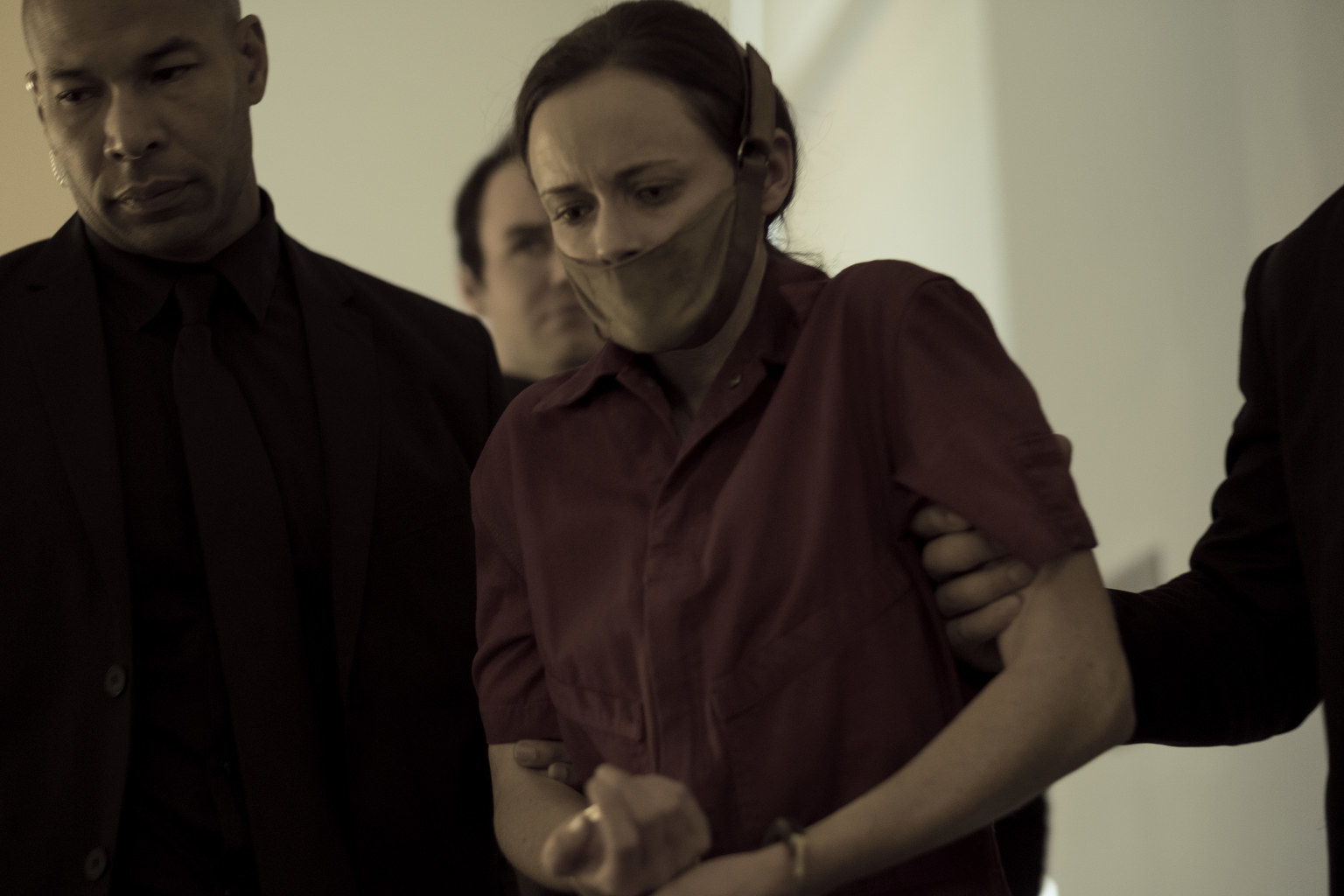
Bruce Miller, a veteran of network and cable television, had heard about the potential Handmaid's Tale TV series, and assumed they were looking for a woman to run it, since "it's such a female-driven project," he said. But, because Atwood's novel was his favorite book, he nevertheless "waited patiently for them to let me come in and talk to them about it," something he felt he'd had "32-some years of prep" to do, having first read the novel in college. The TV adaptation of The Handmaid's Tale had been in development for years, with Ilene Chaiken, the creator of The L Word, spearheading it for Showtime. When Showtime passed, MGM Television, which owned the rights to the property, sold the show to Hulu. But by then, Chaiken had become the showrunner of Fox's Empire, and had an exclusive deal with Fox. She was no longer available to do it, though she is an executive producer on the series.
Enter Miller, who began to create the show anew in early 2016.
He wanted to make Gilead feel as close to the real world as possible — in order to create fear in viewers. "You're building a world, and if that world doesn't feel like our real world in a lot of ways, then it isn't scary anymore," he said. He focused on every detail: how Offred would spend her day, whether she would eat in the kitchen or up in her room — "a Seinfeld-level minutia of her life," Miller called it.
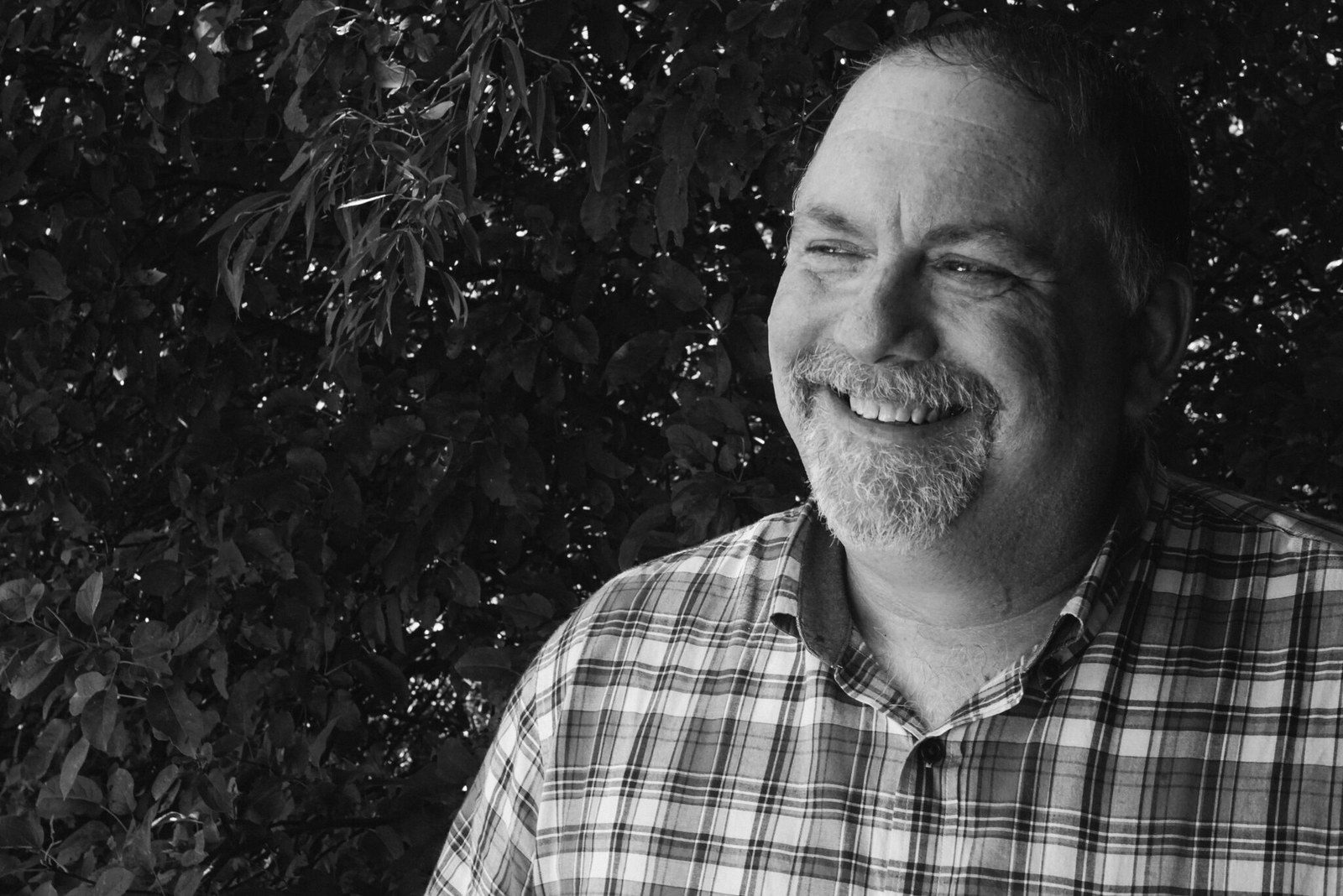
His vision for the adaptation was all about the character of Offred. (The Handmaids' names signify the ownership of their Commanders: "Offred" is "of Fred;" there's also Ofglen, Ofwarren, and so on.) Miller felt that the perspective of Offred (or June, her real name) was the essential gear to tell the story. As June — whose life with her husband, Luke, and daughter, Hannah, we see in flashbacks — she was a passive witness to the abrupt, sweeping curtailment of women's rights. Her bank account was seized, and given over to Luke; on the same day, her job as a book editor was eliminated, as ordered by the new government — and it happens simultaneously to every woman. As Offred, she has a firmly limited point of view: "You only know what she sees; she doesn't know anything," Miller said. And, he felt, "that's what makes it scary."
While Offred is practically silent, speaking only when spoken to, she does deliver scathing thoughts in voiceover: "Ofglen is a pious little shit with a broomstick up her ass," is one early on; and while heading out for shopping, "I don't need oranges. I need to scream. I need to grab the nearest machine gun," is another.
By the time Miller had written the first two scripts, Warren Littlefield was considering executive producing the show. The former president of NBC during the must-see-TV era — during which Seinfeld, Friends, and ER reigned — has become a successful producer (of FX's Fargo, for one). Littlefield's agents at William Morris Endeavor told him "we really think this might be something you should look into," he said.
Oh, and also, they added, they wanted him to convince Moss, another WME client, then in Australia filming the second installment of the crime drama Top of the Lake, that she should star in it. After reading Miller's scripts, Littlefield was very interested — but when it came to twisting Moss's arm, he said, "I was, like, 'OK, you know I've never met this woman, right?'"
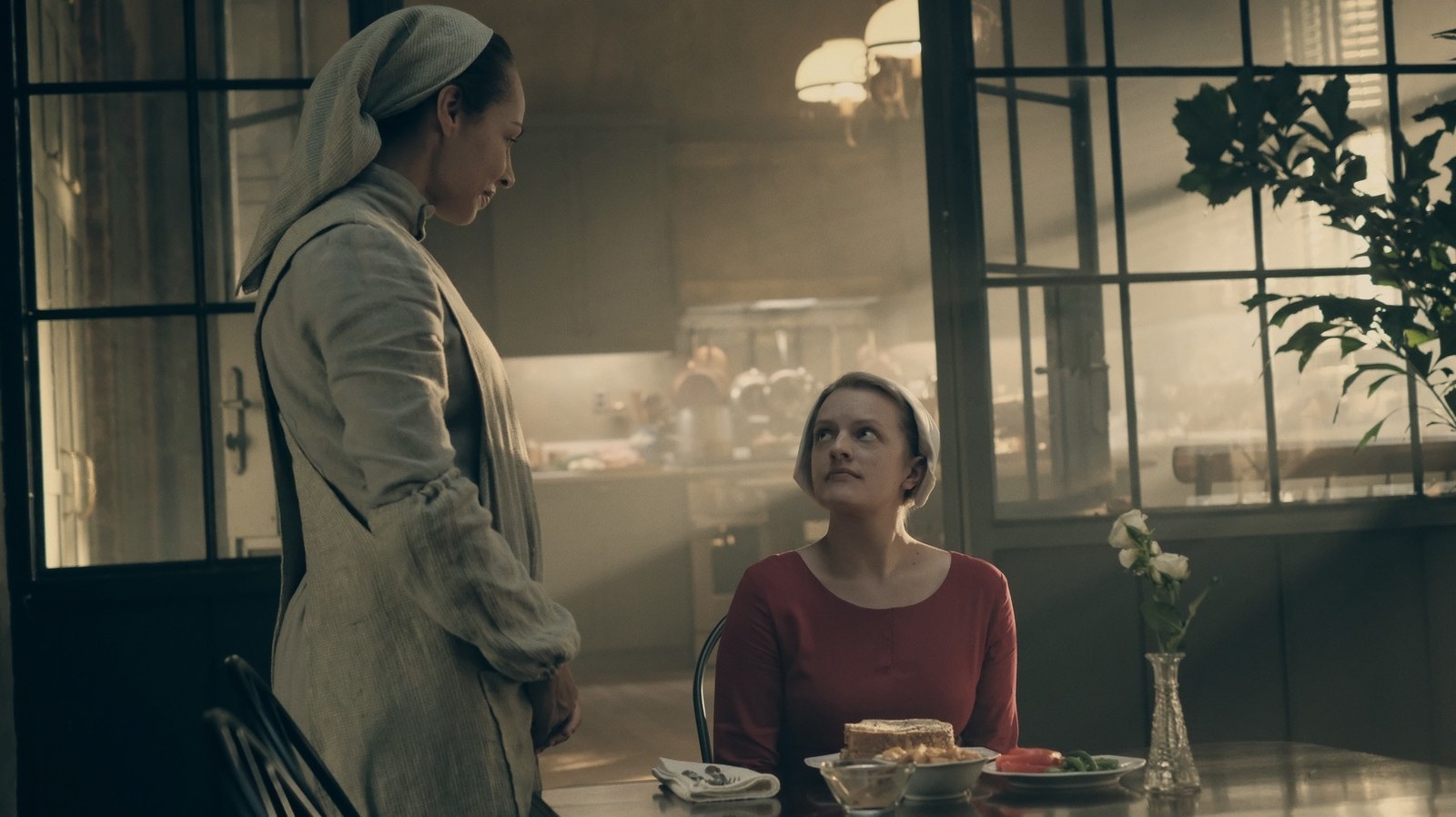
Moss had come off of seven seasons of Mad Men, in which she had starred as Peggy Olson, the ambitious ad woman who had at various times been Don Draper's protégé, conscience, rival, and surrogate daughter. The show ended in 2015, and Moss was tired. Nevertheless, she had starred in a few indie movies, and agreed to reprise her role as Robin in the Emmy-nominated Top of the Lake.
"I got on the phone with Lizzie, and I said, 'Look, you're in a position in your life where you've got incredible choices based upon the quality of the work that you've done,'" Littlefield remembered. "'I don't mean to compare myself, but I'm also in a position where I've got some pretty good choices myself. I just have to say, forget what makes sense: This is just a remarkable opportunity. And I'll do it if you do it.' She said, 'I think we have to do it.'"
Moss hadn't wanted to do another drama series right away, especially one in which she would be in nearly every scene. Miller understood her dilemma. "All the things that are kind of a grind about making television series were multiplied exponentially with this project," he said. "She was going to be basically two characters. One was Offred, and one was June. So for every scene she had to shoot, she also had to do a lot of voiceover for it. And she was in everything!"
"It was one of those, like, eyeroll, oh fuck," Moss said. "Like, really, so soon? And then it was another eyeroll, oh fuck after I read it, because it was so amazing." She asked to read the second script to be sure of the show's quality. "And the second script, in my opinion, was better than the first one."
Still, she wasn't entirely sold. And then: "I thought about someone else doing it, and experienced such searing jealousy that I was like, I have to do it. I ain't letting some other bitch come and do this. I will be so jealous and pissed."
The trio of Miller, Littlefield, and Moss (a producer on the show, too) was now in place.
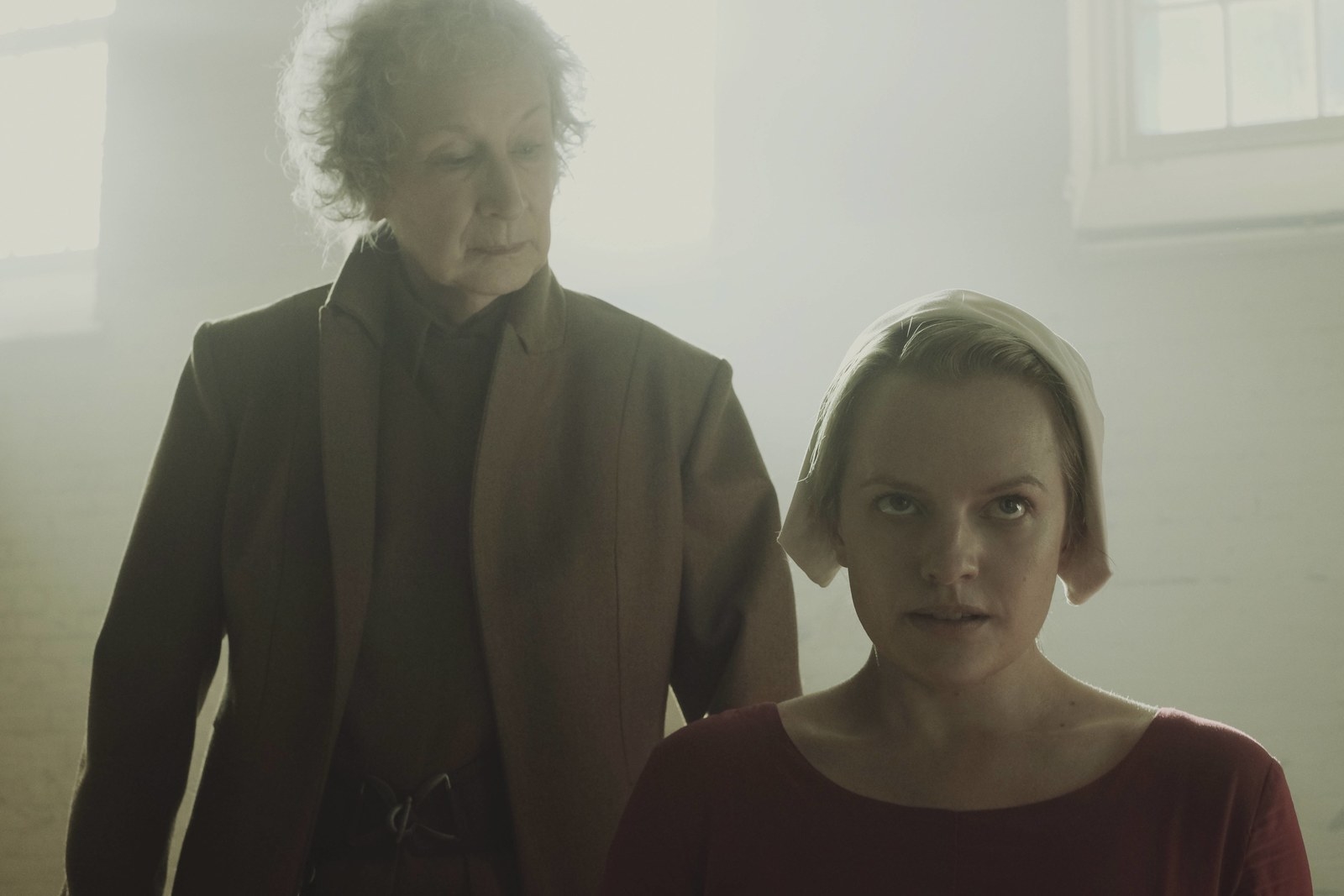
Miller put together a writers room of five women and one other man. The Handmaid's Tale isn't a long book — 311 pages — and they had to study it for clues to develop the secondary characters and build the world of Gilead. They wanted to hew close to the book, and change things only in a "thoughtful" way, Miller said. For instance, Offred's real name is never revealed in the novel. But the name "June" is something readers have gleaned to be Offred's name over the years, because in the first chapter, when the Handmaids are in a training center and whisperingly introducing themselves, it's the only name that doesn't appear again. Atwood wrote in the New York Times, "That was not my original thought but it fits, so readers are welcome to it if they wish." The show was welcome to it as well.
Atwood served as a consulting producer on the series, and was, Miller said, "quite encouraging of that — of taking the world and stretching it, and diving in deeper." After women lose their rights to their jobs and money in the book, there's a mention of a protest that was met by a strong military presence and gunfire. In the show, it's dramatized in Episode 3, and is — chillingly — a women's march: People are slaughtered in the street, and June and her best friend, Moira (Samira Wiley), flee.
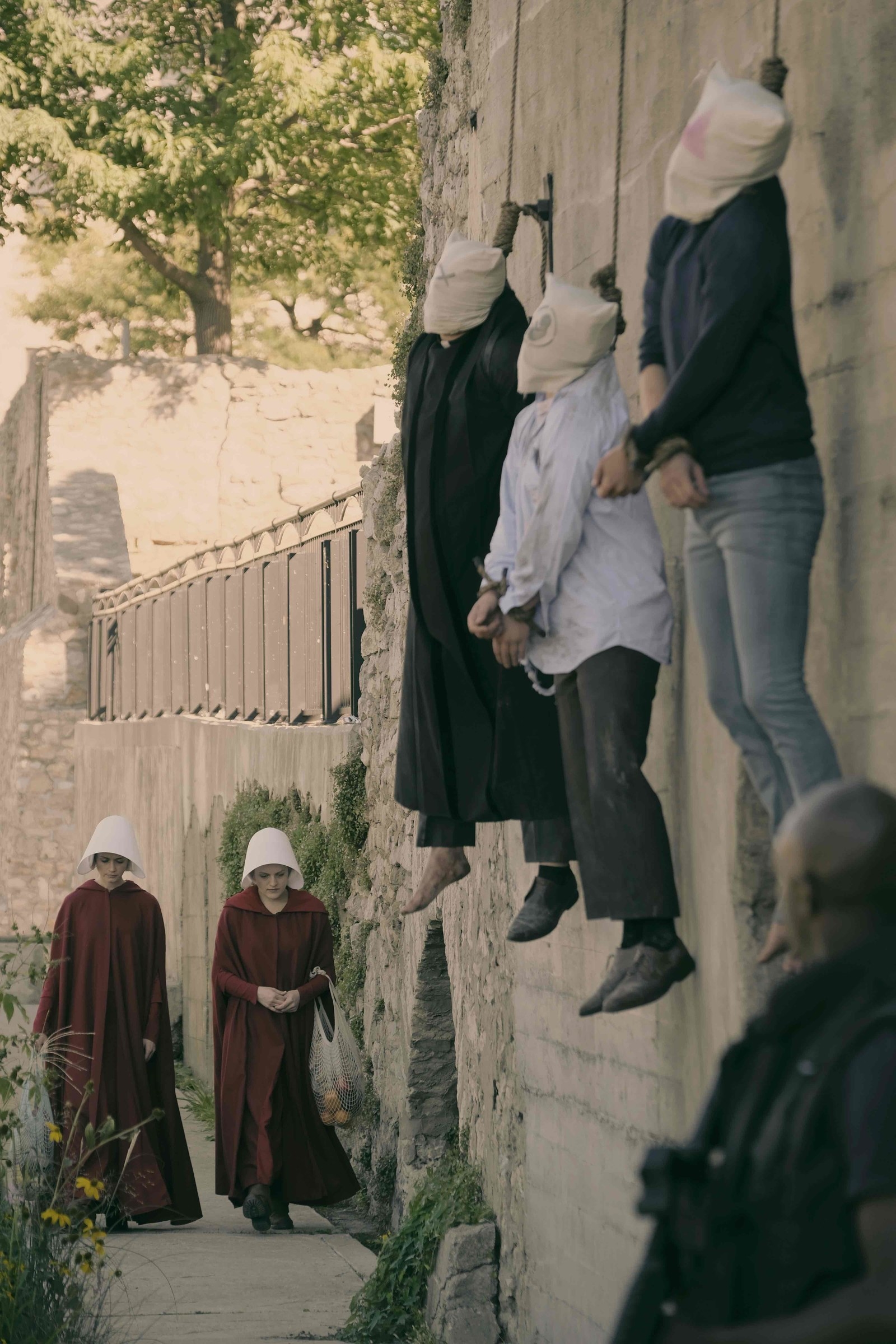
Another change the writers made was with Offred's voice. In the book, she's matter-of-fact, whether she's remembering her old life, or witnessing hanged bodies strung up at the Wall. (Though the book never states that Offred lives in Cambridge, Massachusetts, textual clues and Atwood herself confirm she does: The Wall is part of the Harvard campus — and Cambridge is played by Toronto on the show.) In order to make Offred "relatable" and someone viewers could "connect with," Miller said, she needed to change her tone. "I felt like in the book that she was at times very plucky and had a lot of resistant spirit," Miller said — but the audience would want more, he thought.
"The people I know who are like June are a little more cutting," he said. "They use colorful language. I just wanted to portray her like someone I knew, like one of my sisters." So when the show's Offred sees the hanged bodies, she says in voiceover: "A priest, a doctor, a gay man ... I think I heard that joke once. This wasn't the punchline."
In the book, the birth rate crisis is specified as afflicting white people. But Miller wanted to cast people of color in the series, so Luke (O-T Fagbenle), June's husband, is black; their sought-after child, Hannah (Jordana Blake), who is taken from June in the show's opening scene, is mixed race; Moira becomes a black (and secretly lesbian) Handmaid; and Nick, the household's chauffeur and Offred's love interest, is played by Max Minghella, who's of Asian descent. "I don't think there's any difference in appearance between making a TV show about racists to making a racist TV show," Miller said. "It may intellectually be different, but it doesn't look any different on television."
It wasn't only that Miller did not want to make an all-white television show — he felt that adding white supremacy would simply be too much for the story to bear: a narrative about authoritarianism, surveillance, and their intersection with race would have many more layers now than it would have in 1985. "When you're dealing with politics and power and religion and misogyny at this kind of level, to throw in race relations seems like a little too much to chew off in one narrative setting," he said. "Fertility trumps everything. I'm making that decision for them, but it seems like a logical decision they would make."
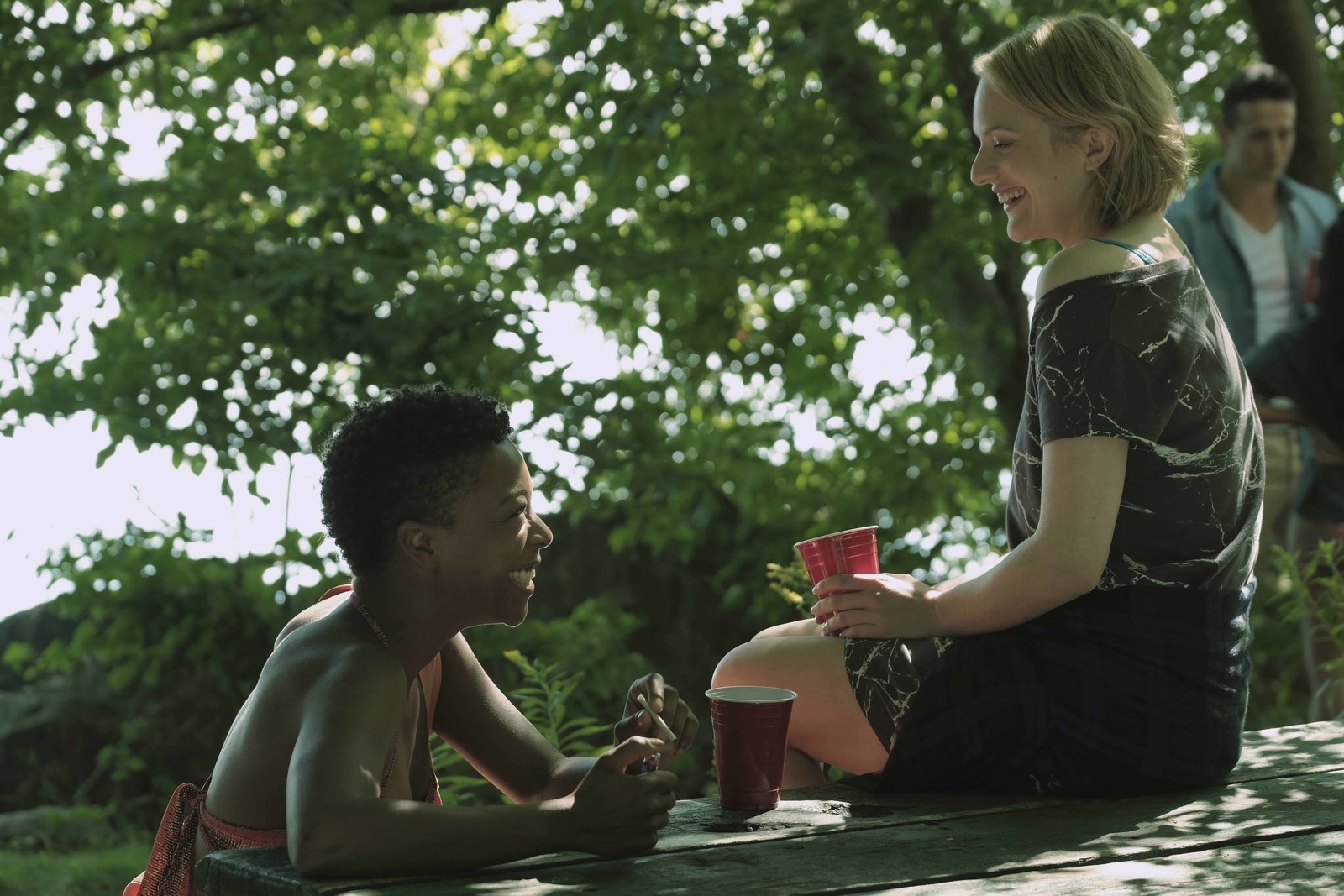
Miller, Littlefield, and Moss needed to find a director for the show, and they wanted a woman, though that was, Littlefield said, "not carved in stone." The show was a sought-after project, and it was very possible they could get a prominent feature director. But in an unlikely turn, they chose Reed Morano, whose career up until recently had mostly been in cinematography (she was one of the cinematographers of Beyoncé's Lemonade, shooting the "Sandcastles" segment).
"On most levels, you don't turn over Hour 1 of your new series to Reed Morano — she was a longshot candidate you wouldn't bet on getting the assignment. But it was her passion and her vision," Littlefield said. "She gave us an articulated vision for the show — a lookbook that kind of blew us away, and a soundtrack. And we said, 'You know what? Forget logic, forget resumé. This makes sense.'"
No one was more surprised than Morano. She had been doing what's called "the water-bottle tour" — meetings with network and studio executives in which you're always offered a water bottle — in order to drum up TV directing work. Her agents had sent her the script for The Handmaid's Tale, and when she met with Hulu, she mentioned it, but felt she had no shot. "There's no chance," she remembered thinking to herself. "I have no chance, but if ever there was a pilot I thought I could do, it's this one."
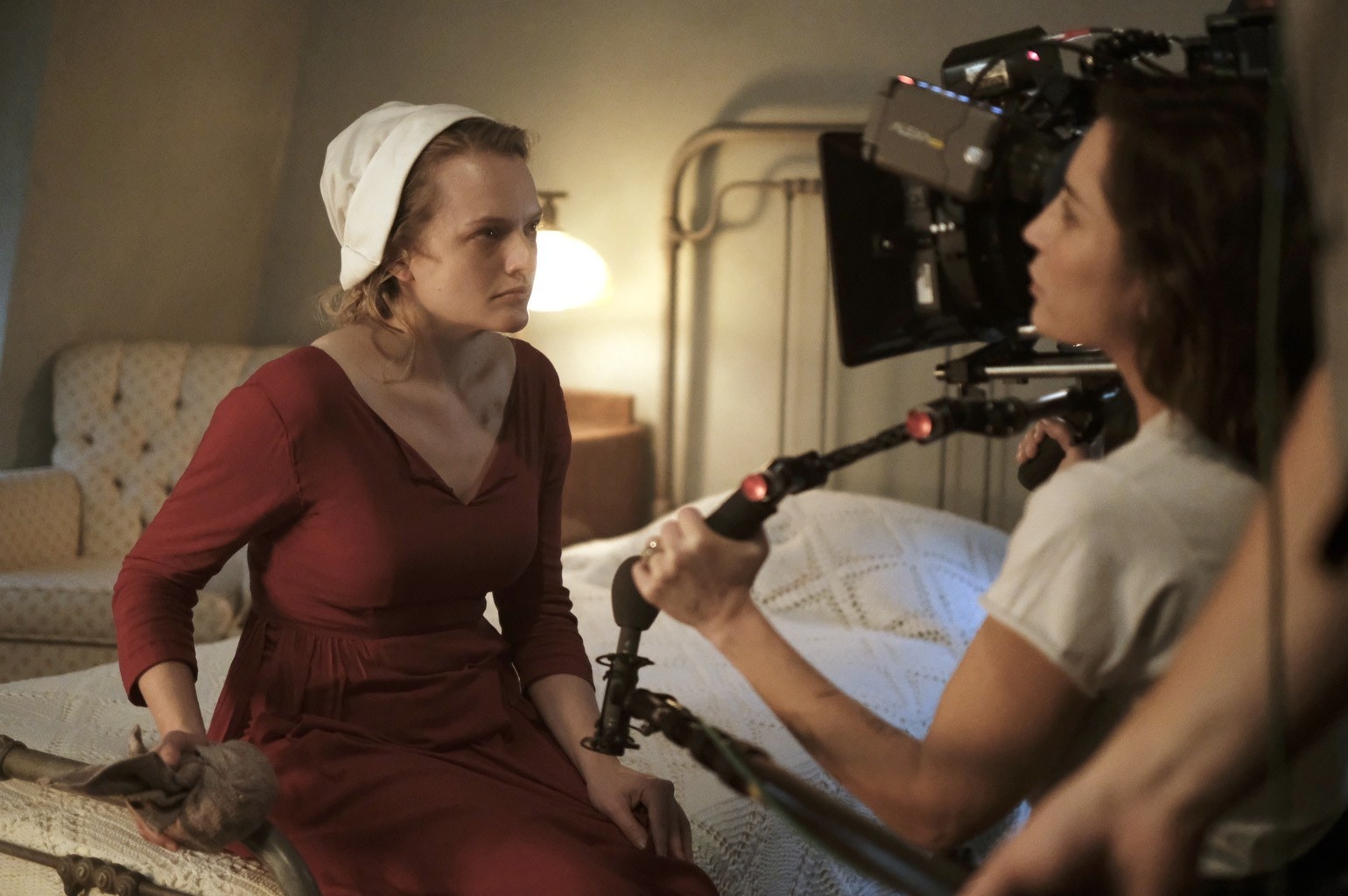
Still, she got the opportunity to pitch Miller and Littlefield, and she felt that Moss, who had appeared in her indie feature Meadowland, was pulling for her. She said she listened to "crazy music," and gathered as many images as possible to illustrate what the show would look like, which her assistant turned into a hardcover book to send to Miller.
In her vision, Gilead would be "symmetrical and composed and a bit cold and drastically color coordinated," and the flashbacks of June and her family would use a "very romantic camera — and treat them like fleeting memories." They would be, Morano said, "a little bit impressionistic, and not totally give away every detail, and not connect every dot."
She also had particular ideas of how to shoot Offred, whose point of view is also the audience's. She wanted a "wide lens very close for her closeups," Morano said. "If you are physically close to the character, or there's less glass between you and them as an audience member, you actually feel uncomfortably close with them in their environment."
Not only did Morano get the job to direct the first Handmaid's Tale episode, she directed its first three. That decision, Littlefield said, was because Morano's ideas were so distinct that they wanted to create an "imprint" for the show. "We're not going to double down, we're going to triple down," he said. (Those three episodes begin streaming Wednesday, to be followed by weekly installments for 10 episodes in total.)
The bet on Morano, who also has an executive producer credit on the show, is paying off: Critics have been unanimously praising the show's direction. (BuzzFeed News' Anne Helen Petersen wrote that Morano uses a "vibrant film language that not only proves itself the equal to, but expands upon its canonical source text.") "All the instincts that we had about her, those instincts paid off with what she delivered. Very visceral, powerful, honest, incredible visuals," Littlefield said. "Which achieved what we wanted to — that it would not look like anything else on television."
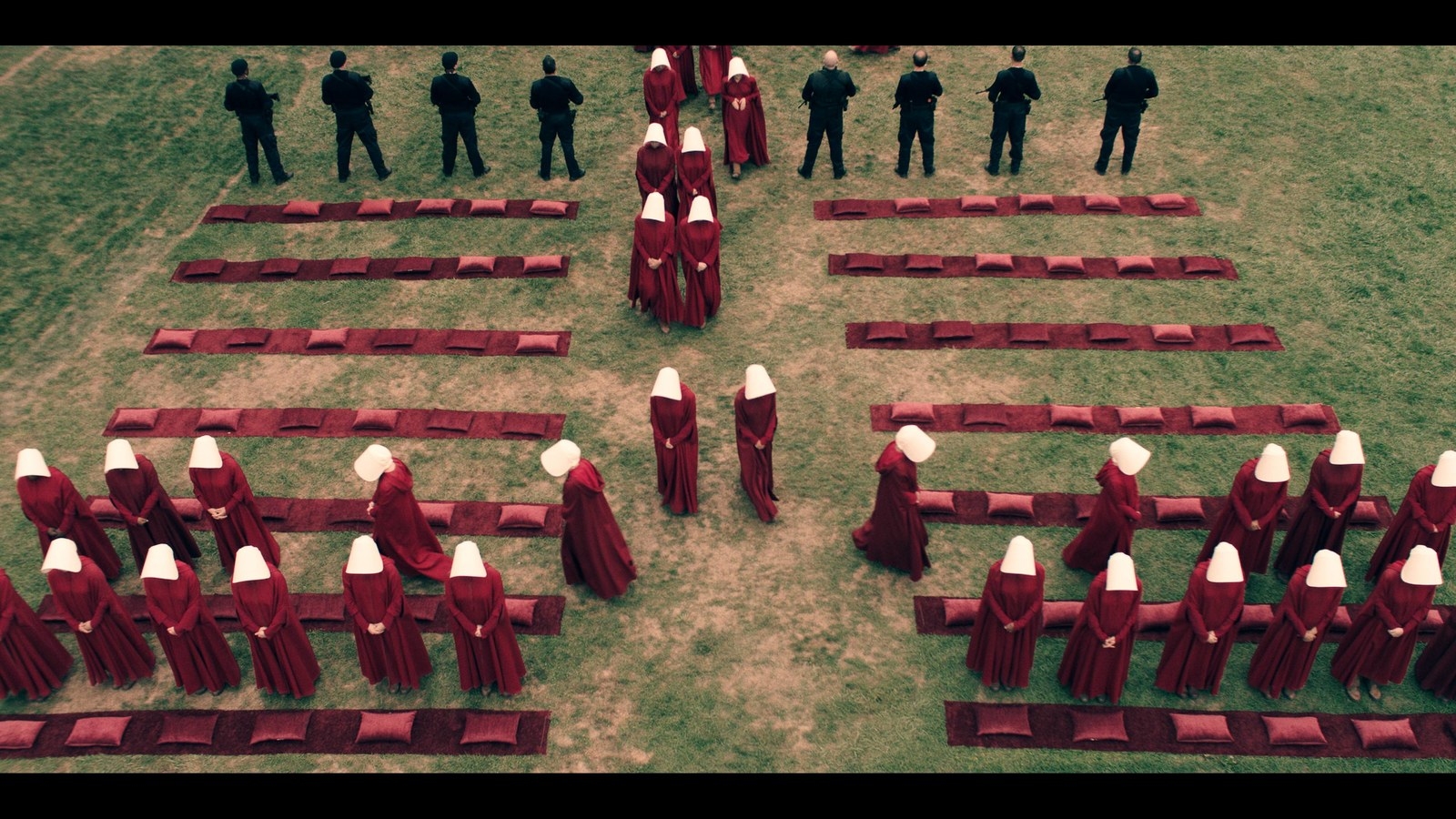
And it could not be premiering at a more eerie time, as reviews of The Handmaid's Tale have pointed out. In the present moment, Atwood wrote recently in the New York Times, "basic civil liberties are seen as endangered, along with many of the rights for women won over the past decades." She also noted that "hate for many groups seems on the rise and scorn for democratic institutions is being expressed by extremists of all stripes."
As the months leading up to the election passed by, Moss, from her perch in Australia thought, "What the hell's going on over there? Like, a laughing matter." Joseph Fiennes, who plays Commander Waterford, to whom Offred is subjugated, had the same thought. He initially saw Trump's candidacy as "a joke," and was "amazed it lasted so long."
Still, he used Trump as inspiration for the Commander. "He's a much different character, but the world he's decided to inhabit and be an architect of has given him an elitist point of view, and he loves that," Fiennes said. "And he abuses it. He has a moral standard that's almost Biblical, yet he completely does the opposite of what he preaches. So that's power. If you can do that, if you can abuse your position, that's power. It's a corruptive drug. And I see that with Trump."
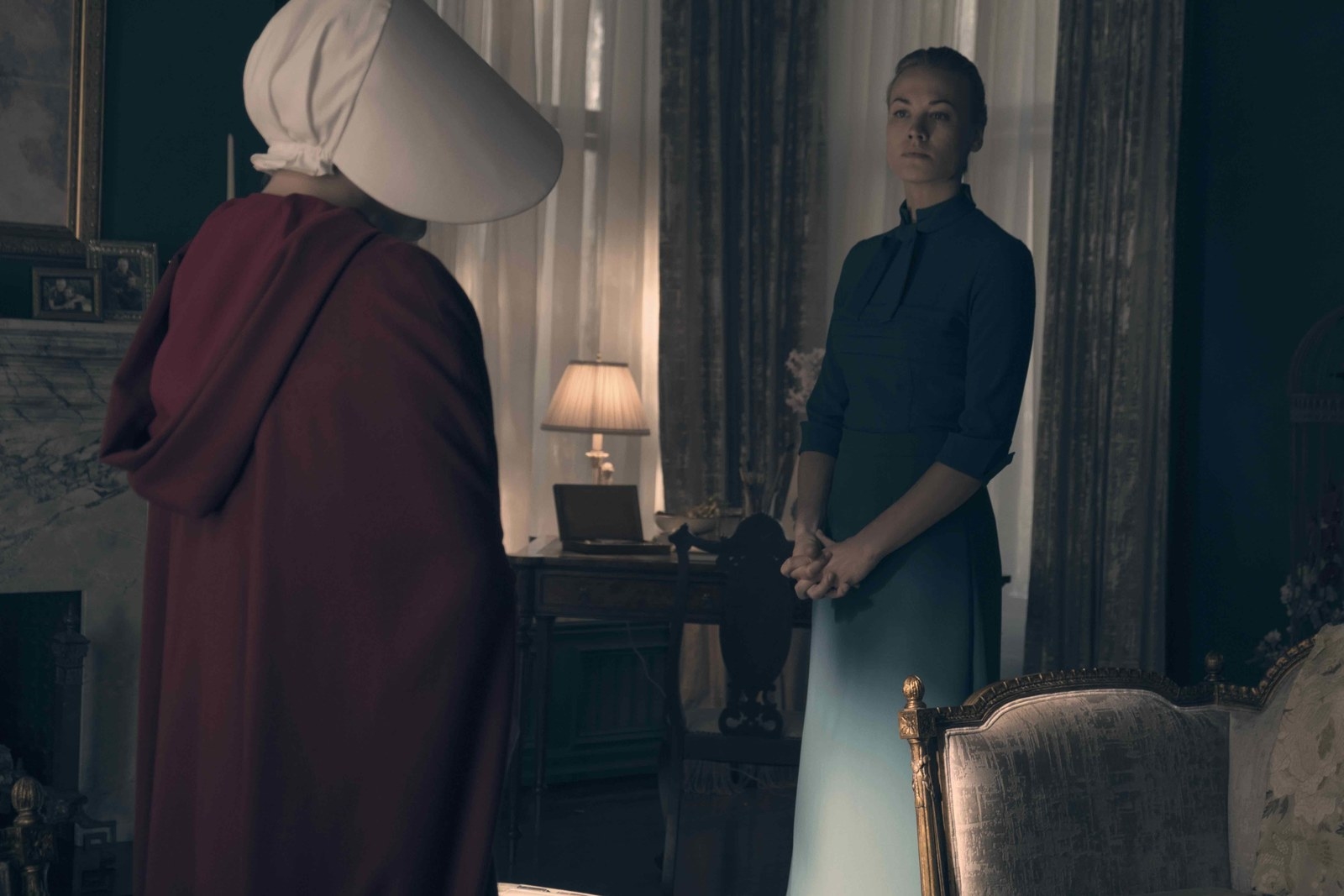
Miller used the unusual coarseness of the presidential campaign for inspiration for the characters of Waterford and his wife, Serena Joy (Yvonne Strahovski). "There were a lot of ugly things said in the election this year," Miller said. "Normally, those ugly things are thought and not said out loud. Having them said out loud was startling — but it helps you write characters who think those things. I think in terms of the Commander and Serena Joy and the people in power, that did help me write."
And then the election took place. Wiley, in an interview in January, said, "Everywhere in this country, there was a palpable difference from the day before to the day after the election, regardless of where your support lies."
Moss, who describes herself as a "big proponent of women's rights, but also a big proponent of human rights," said the morning after the election, "I definitely had people patting me, like, Are you OK? Like someone had died."
They were filming the show's fourth and fifth episodes that week, and what had always been meaningful material suddenly felt almost unbearably weighty. Moss was shooting a scene with Fiennes in which Offred asks the Commander about a message in Latin she's found carved in her room, nolite te bastardes carborundorum, which he tells her is colloquially translated to "don't let the bastards grind you down." Offred then knows that a previous Handmaid had written that, and it gives her hope. "I get chills talking about it," Moss said. "It was like —" she exhaled audibly.
"Everything becomes so much more emotional!" Moss continued. "We did another scene where Joe has another amazing Margaret Atwood line: 'Better never means better for everyone, it always means worse for some.' And it's a really crazy position to be in when you're standing on set and someone says that to you."
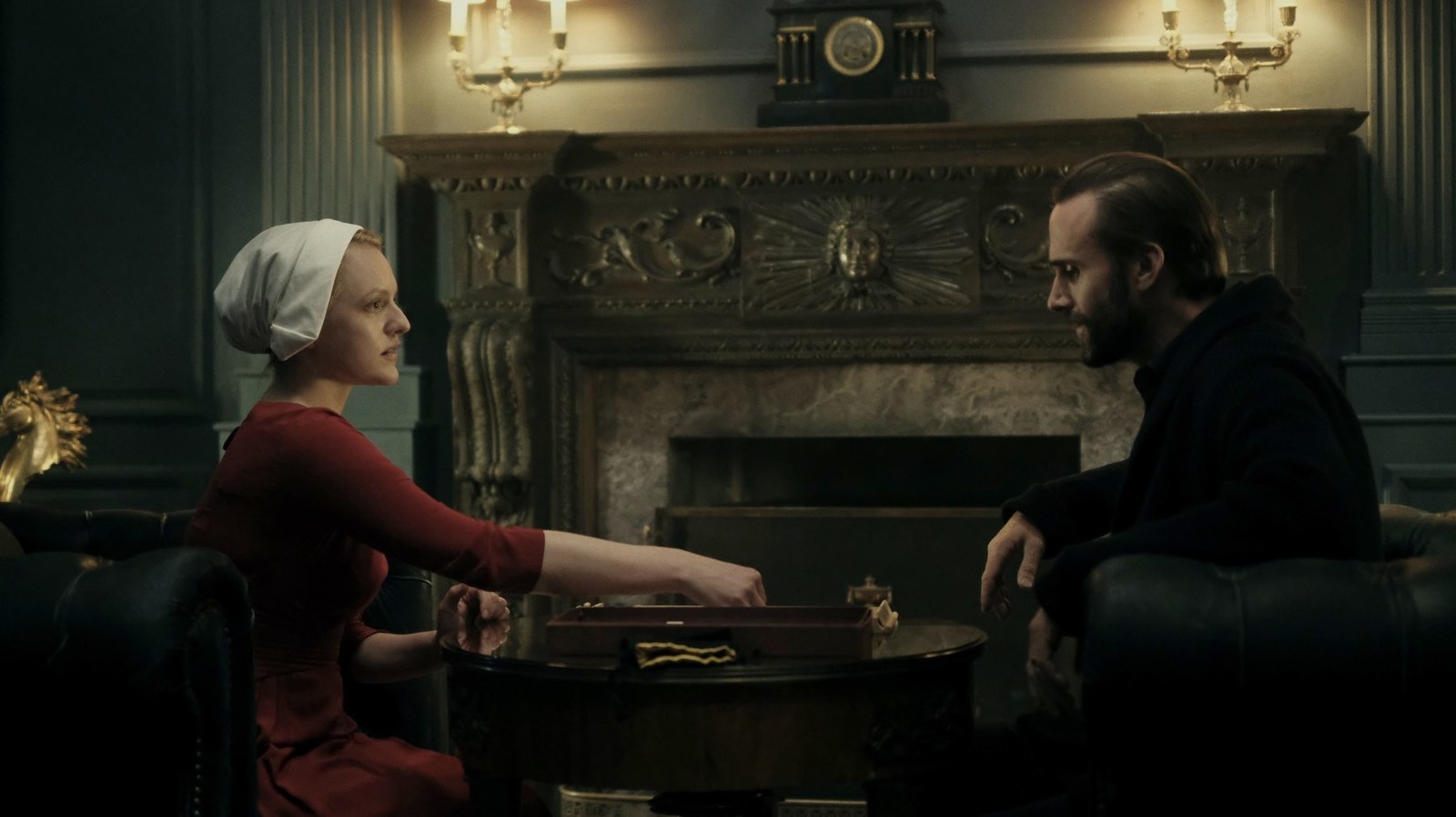
Morano was in the editing room working on her episodes when Trump was elected. "Everything that was already a powerful statement was way, way, way amplified," she said. "I was, like, 'Wow, what we all joked about on set was that obviously would never happen. Hahaha, it's so funny that that's happening. So funny for our show!"
"The bottom line is that everyone was so blindsided by the results," she said. "It was extremely morose on set."
Littlefield felt an "increased pressure" to do the material justice. As far as his current feelings on Trump go, he said, "I lived through Nixon, I lived through Bush 43, I've lived through a lot. I've never been more terrified of what this administration might do."
If all of these sentiments from the cast and creative team make it appear that The Handmaid's Tale is just for the so-called out-of-touch coastal elites who don't understand Trump voters, Moss said that's not the case. "I'm not trying to teach anyone how to think, or what side to fall on," she said. "I'm just playing a woman who's had this happen to her."
The Handmaid's Tale is not, nor is it ever going to be, ripped-from-the-headlines. And after the election, Miller, for one, took solace in how far the US is from Gilead, with what he called our "messy, loud, annoying, frustrating system."
"When you look at Gilead, it's this beautiful world that's horrible," Miller said. "But it was fascinating to me that every time I looked around and everyone was mad or protesting or yelling at each other, I was more appreciative of the freedoms we do have, and how mad we're allowed to get publicly. Strangely, it was encouraging."
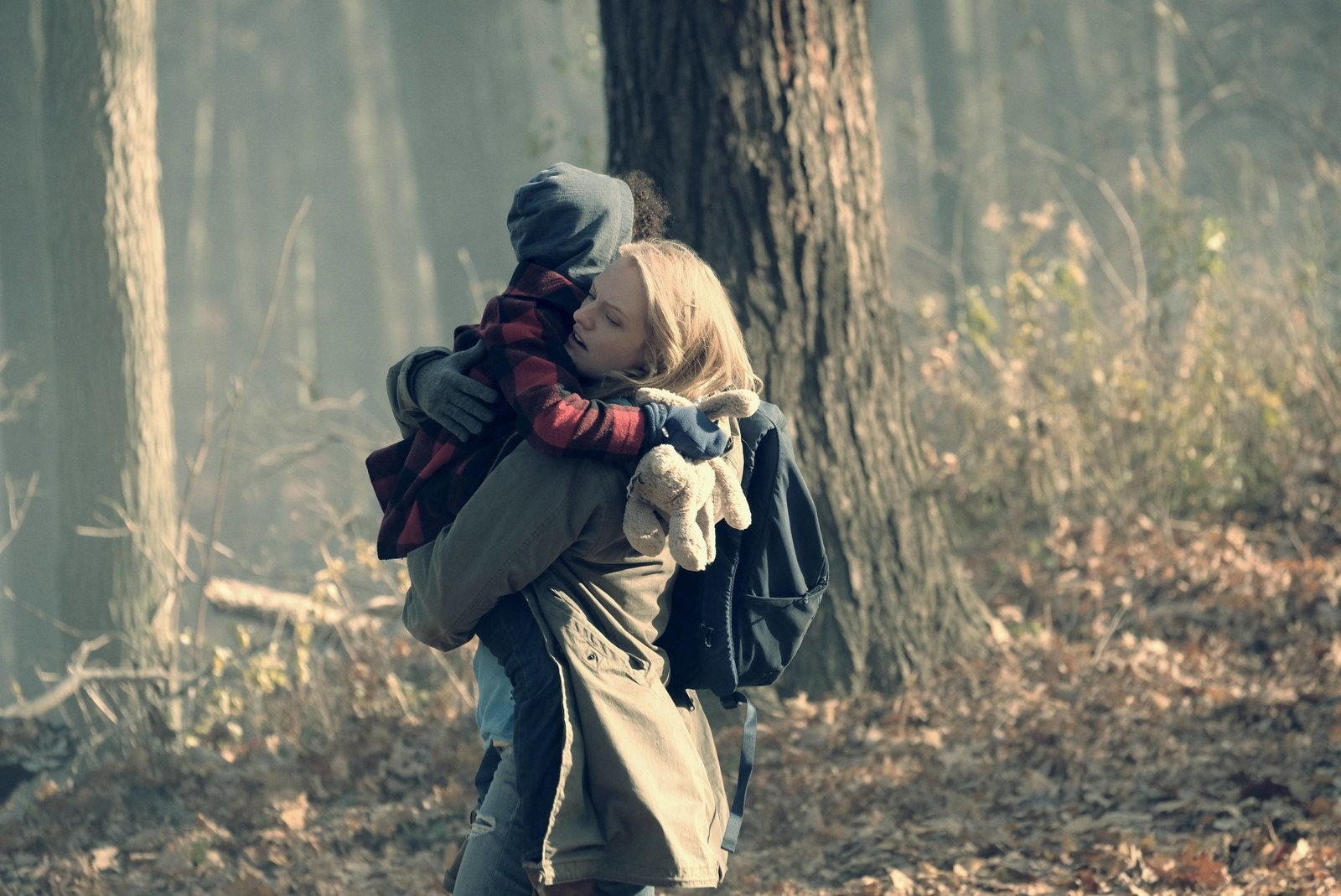
Offred's story comes to an abrupt stop — warning: the following is a spoiler about the ending of the book The Handmaid's Tale — when a black van comes to haul her off. It's unclear whether she's being taken away to a terrible fate, or whether she's being rescued by the resistance movement. The final sentence is: "And so I step up, into the darkness within; or else the light."
There is, however, a final chapter in the book, entitled "Historical Notes," set in June 2195 at an academic conference. As a professor delivers a talk at the conference called "Problems of Authentication in reference to The Handmaid's Tale," we learn that Gilead fell and that Offred's narrative has been put together from 30 cassette tapes found in (what was) Bangor, Maine, when she was possibly on her way to Canada. But no one knows what happened to her after that.
"I'm not alone in saying that the end of the book is so fucking frustrating, you want to throw it across the room," Miller said.
"When it ended, I was, like, 'Are you fucking kidding me? How dare you, Margaret Atwood!'" Moss said with a laugh. "I'm never allowed to know what happens? So as a fan of the book, I'm excited to see what happened to June."
Assuming there are more seasons of The Handmaid's Tale, we will see much more of what happens to June, possibly to fruition. Miller said excitedly: "I get to go beyond it! So there's that abject pleasure of going ooh, what happens next?" [Update: Hulu has renewed the show for a second season.]
Does June find Hannah? Is she reunited with Luke, who is presumed dead? How does Gilead collapse, and what role do Offred and Ofglen (Alexis Bledel) play in that? Will the Commander and Serena Joy be punished, or could they somehow find redemption?
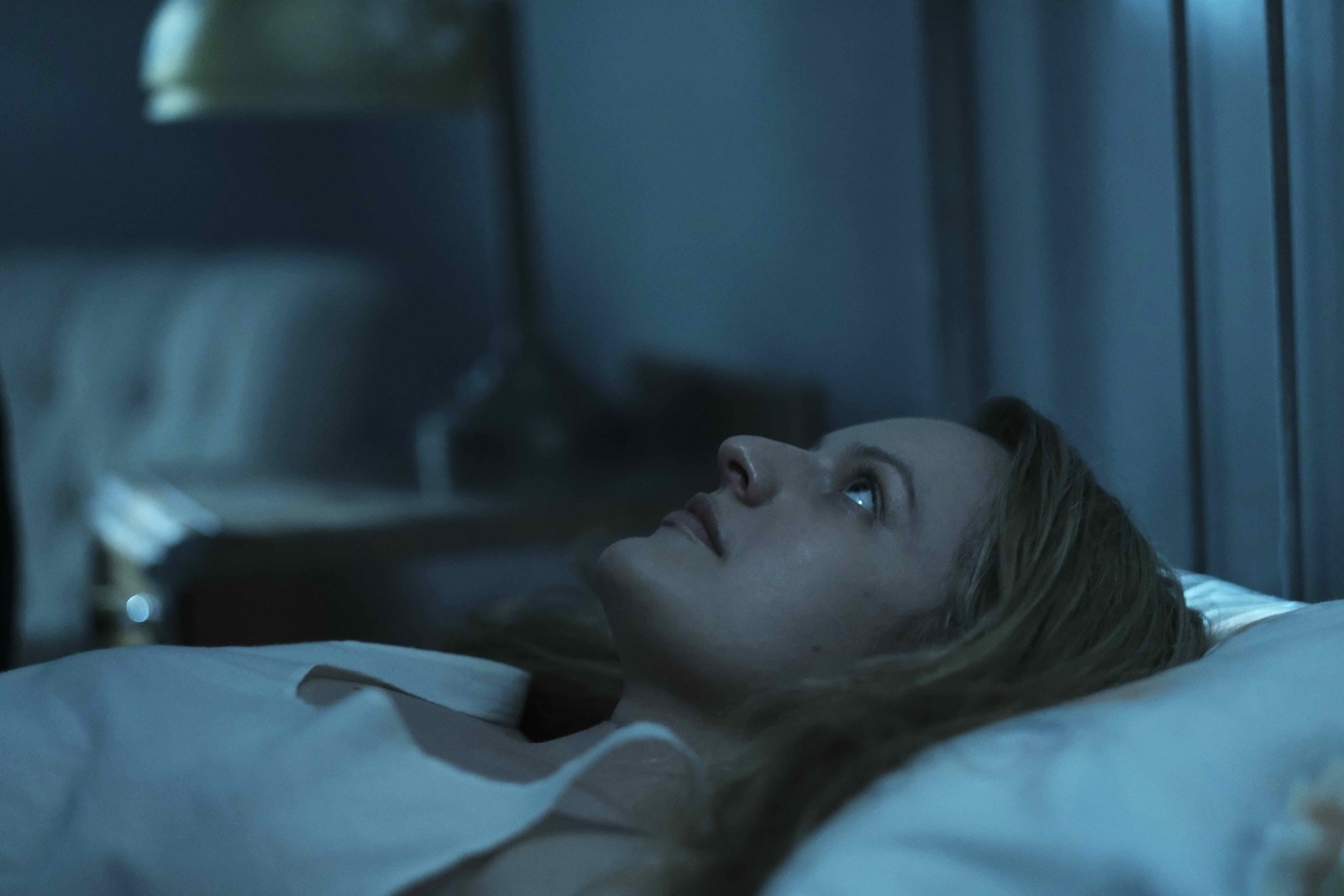
Miller wants the show's message to be hopeful. "No matter how powerless you feel at times, and no matter how large, oppressive, and seemingly impenetrable the power structure is that's sitting upon you, there are always ways to resist," he said. "And that is what Offred's amazing story is about — she is seemingly in a position where she has no levers of power. And that's completely wrong."
At the end of the first episode of The Handmaid's Tale, the audience gets a taste of that resolve. She has just learned of the resistance, from Ofglen, an active member. When she returns to her room, she delivers a speech in voiceover: "It all has to look the same. Because I intend to survive for her. Her name is Hannah. My husband was Luke. My name is June." It's the first time viewers have heard her name, and her family's names. She looks up with grim determination as "You Don't Own Me" by Lesley Gore plays over the end credits.
"It's about a woman who won't give up," Moss said. "It's about a woman who's had everything taken away and been abused, physically and mentally, and is raped once a month. And she won't give up. If there isn't a more hopeful story than that, I don't know what it is."
UPDATE
This story has been updated with the news that Hulu renewed the show for a second season.
Outside Your Bubble is a BuzzFeed News effort to bring you a diversity of thought and opinion from around the internet. If you don’t see your viewpoint represented, contact the curator at bubble@buzzfeed.com. Click here for more on Outside Your Bubble.

